University Essay: Enlightenment and Enthusiasm in the 18th Century
VerifiedAdded on 2023/01/19
|11
|3321
|71
Essay
AI Summary
This essay delves into the complex relationship between the Enlightenment and religious enthusiasm, focusing on the perspectives of key figures like David Hume and John Wesley. It examines how the Enlightenment, with its emphasis on reason, viewed enthusiasm as a religious malady, contrasting this with Wesley's concept of heart-led faith. The essay explores Hume's critique of religious enthusiasm and superstition, highlighting their impact on political thought and the French Revolution. It analyzes the historical context, including the role of Methodism and the problem of prophecy, and discusses how religious beliefs influenced political opinions and societal structures in the 18th century. The analysis contrasts the core concepts of Enlightenment and enthusiasm, providing a comprehensive overview of the historical context and the key figures involved.
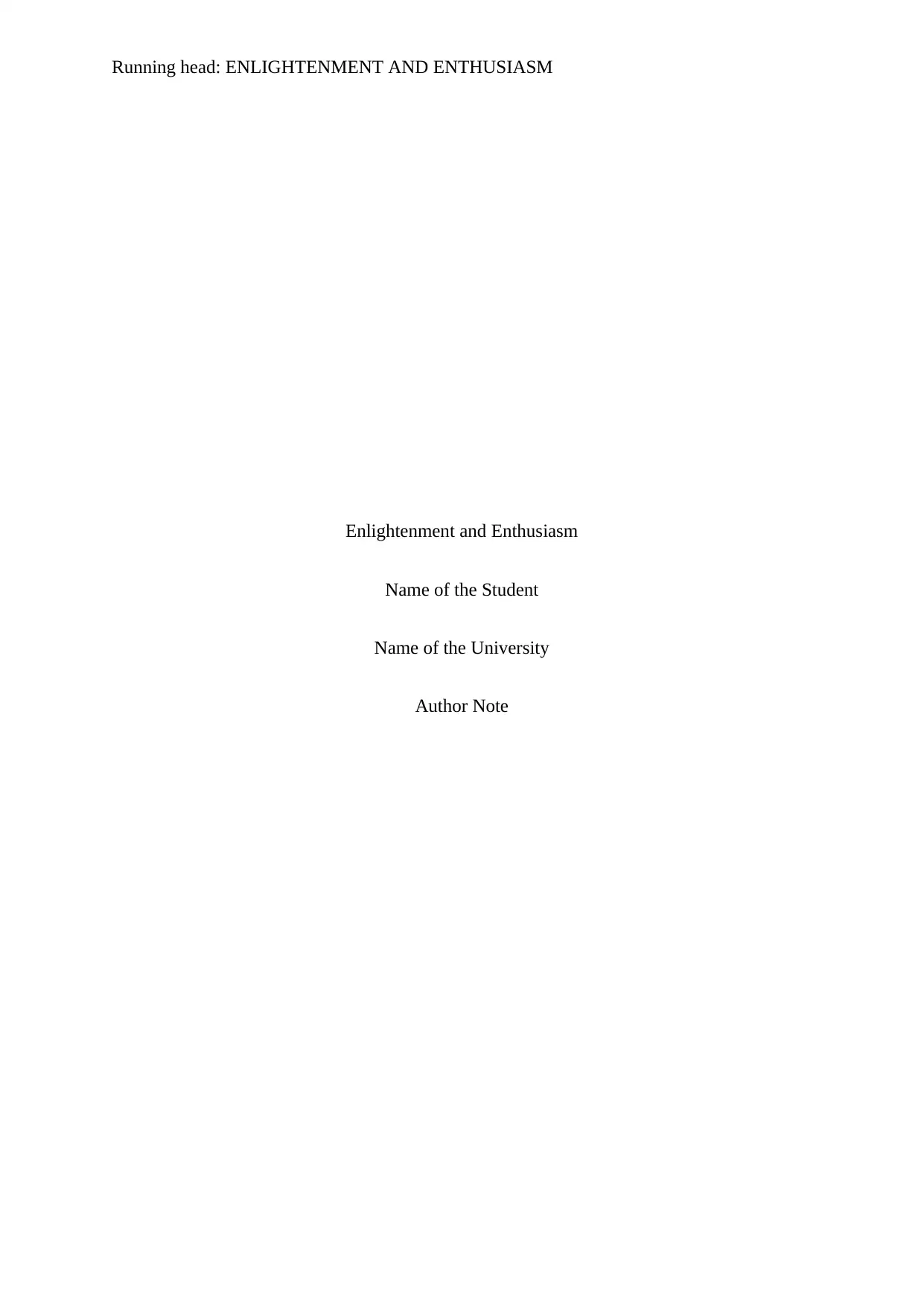
Running head: ENLIGHTENMENT AND ENTHUSIASM
Enlightenment and Enthusiasm
Name of the Student
Name of the University
Author Note
Enlightenment and Enthusiasm
Name of the Student
Name of the University
Author Note
Paraphrase This Document
Need a fresh take? Get an instant paraphrase of this document with our AI Paraphraser
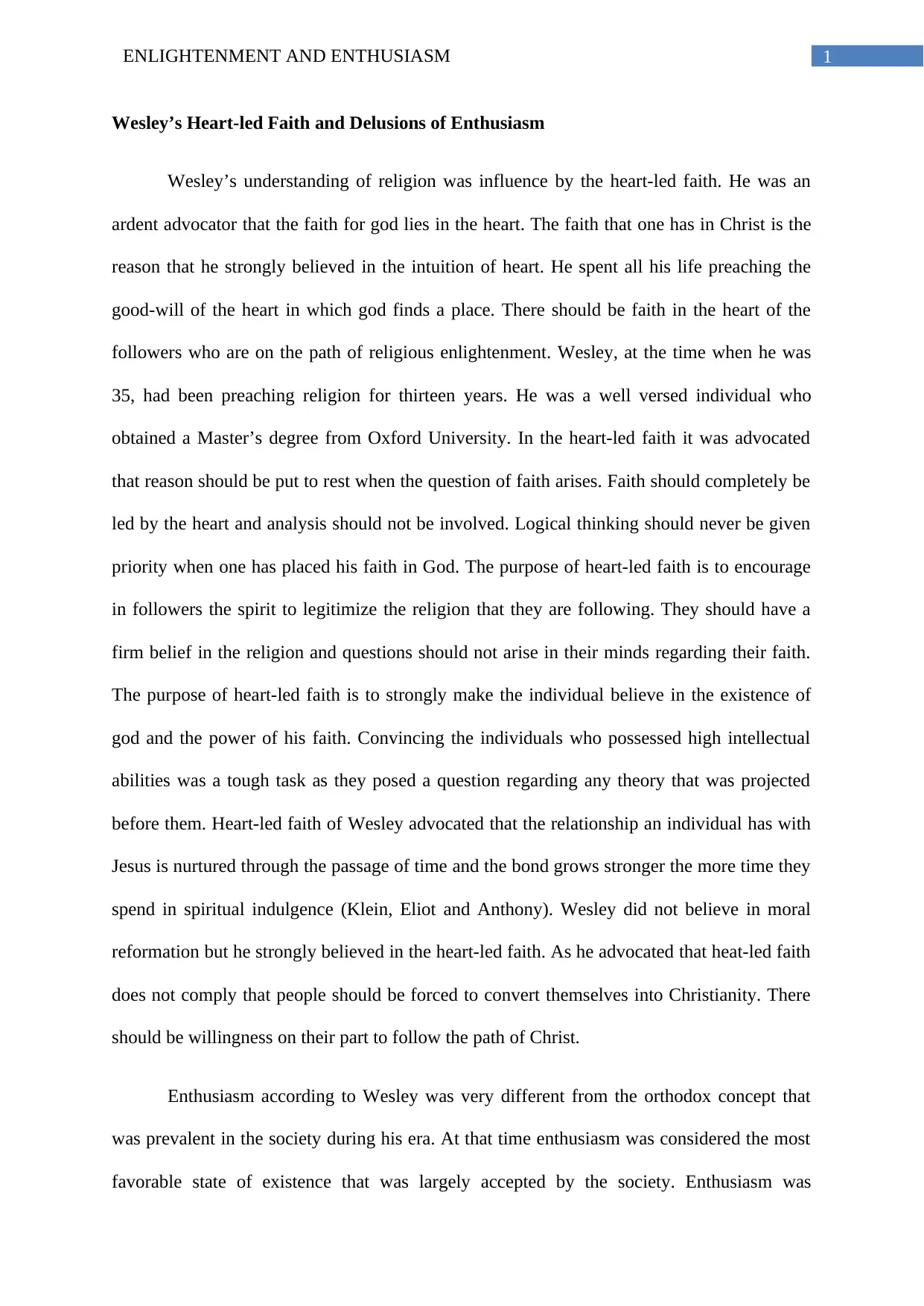
1ENLIGHTENMENT AND ENTHUSIASM
Wesley’s Heart-led Faith and Delusions of Enthusiasm
Wesley’s understanding of religion was influence by the heart-led faith. He was an
ardent advocator that the faith for god lies in the heart. The faith that one has in Christ is the
reason that he strongly believed in the intuition of heart. He spent all his life preaching the
good-will of the heart in which god finds a place. There should be faith in the heart of the
followers who are on the path of religious enlightenment. Wesley, at the time when he was
35, had been preaching religion for thirteen years. He was a well versed individual who
obtained a Master’s degree from Oxford University. In the heart-led faith it was advocated
that reason should be put to rest when the question of faith arises. Faith should completely be
led by the heart and analysis should not be involved. Logical thinking should never be given
priority when one has placed his faith in God. The purpose of heart-led faith is to encourage
in followers the spirit to legitimize the religion that they are following. They should have a
firm belief in the religion and questions should not arise in their minds regarding their faith.
The purpose of heart-led faith is to strongly make the individual believe in the existence of
god and the power of his faith. Convincing the individuals who possessed high intellectual
abilities was a tough task as they posed a question regarding any theory that was projected
before them. Heart-led faith of Wesley advocated that the relationship an individual has with
Jesus is nurtured through the passage of time and the bond grows stronger the more time they
spend in spiritual indulgence (Klein, Eliot and Anthony). Wesley did not believe in moral
reformation but he strongly believed in the heart-led faith. As he advocated that heat-led faith
does not comply that people should be forced to convert themselves into Christianity. There
should be willingness on their part to follow the path of Christ.
Enthusiasm according to Wesley was very different from the orthodox concept that
was prevalent in the society during his era. At that time enthusiasm was considered the most
favorable state of existence that was largely accepted by the society. Enthusiasm was
Wesley’s Heart-led Faith and Delusions of Enthusiasm
Wesley’s understanding of religion was influence by the heart-led faith. He was an
ardent advocator that the faith for god lies in the heart. The faith that one has in Christ is the
reason that he strongly believed in the intuition of heart. He spent all his life preaching the
good-will of the heart in which god finds a place. There should be faith in the heart of the
followers who are on the path of religious enlightenment. Wesley, at the time when he was
35, had been preaching religion for thirteen years. He was a well versed individual who
obtained a Master’s degree from Oxford University. In the heart-led faith it was advocated
that reason should be put to rest when the question of faith arises. Faith should completely be
led by the heart and analysis should not be involved. Logical thinking should never be given
priority when one has placed his faith in God. The purpose of heart-led faith is to encourage
in followers the spirit to legitimize the religion that they are following. They should have a
firm belief in the religion and questions should not arise in their minds regarding their faith.
The purpose of heart-led faith is to strongly make the individual believe in the existence of
god and the power of his faith. Convincing the individuals who possessed high intellectual
abilities was a tough task as they posed a question regarding any theory that was projected
before them. Heart-led faith of Wesley advocated that the relationship an individual has with
Jesus is nurtured through the passage of time and the bond grows stronger the more time they
spend in spiritual indulgence (Klein, Eliot and Anthony). Wesley did not believe in moral
reformation but he strongly believed in the heart-led faith. As he advocated that heat-led faith
does not comply that people should be forced to convert themselves into Christianity. There
should be willingness on their part to follow the path of Christ.
Enthusiasm according to Wesley was very different from the orthodox concept that
was prevalent in the society during his era. At that time enthusiasm was considered the most
favorable state of existence that was largely accepted by the society. Enthusiasm was
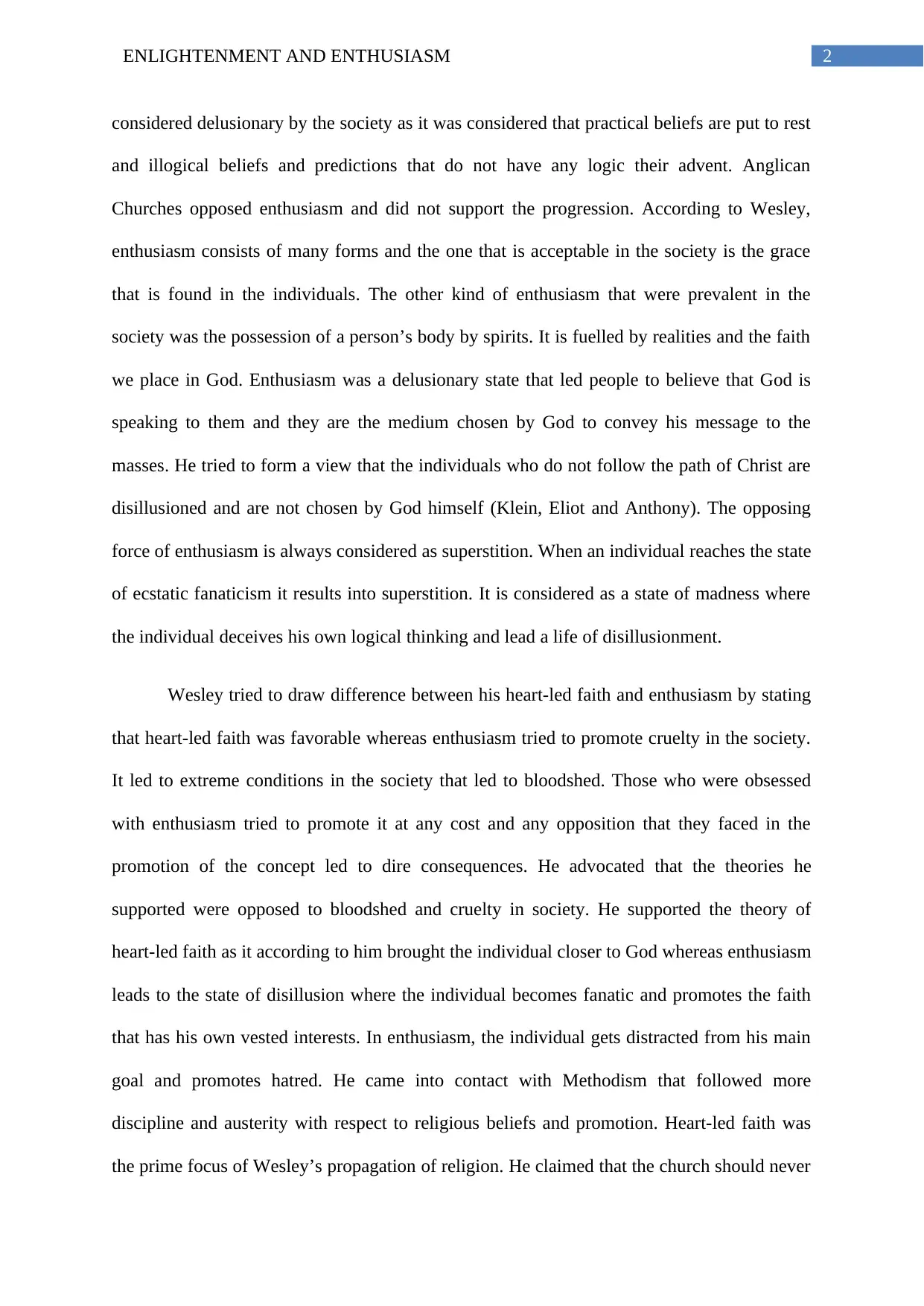
2ENLIGHTENMENT AND ENTHUSIASM
considered delusionary by the society as it was considered that practical beliefs are put to rest
and illogical beliefs and predictions that do not have any logic their advent. Anglican
Churches opposed enthusiasm and did not support the progression. According to Wesley,
enthusiasm consists of many forms and the one that is acceptable in the society is the grace
that is found in the individuals. The other kind of enthusiasm that were prevalent in the
society was the possession of a person’s body by spirits. It is fuelled by realities and the faith
we place in God. Enthusiasm was a delusionary state that led people to believe that God is
speaking to them and they are the medium chosen by God to convey his message to the
masses. He tried to form a view that the individuals who do not follow the path of Christ are
disillusioned and are not chosen by God himself (Klein, Eliot and Anthony). The opposing
force of enthusiasm is always considered as superstition. When an individual reaches the state
of ecstatic fanaticism it results into superstition. It is considered as a state of madness where
the individual deceives his own logical thinking and lead a life of disillusionment.
Wesley tried to draw difference between his heart-led faith and enthusiasm by stating
that heart-led faith was favorable whereas enthusiasm tried to promote cruelty in the society.
It led to extreme conditions in the society that led to bloodshed. Those who were obsessed
with enthusiasm tried to promote it at any cost and any opposition that they faced in the
promotion of the concept led to dire consequences. He advocated that the theories he
supported were opposed to bloodshed and cruelty in society. He supported the theory of
heart-led faith as it according to him brought the individual closer to God whereas enthusiasm
leads to the state of disillusion where the individual becomes fanatic and promotes the faith
that has his own vested interests. In enthusiasm, the individual gets distracted from his main
goal and promotes hatred. He came into contact with Methodism that followed more
discipline and austerity with respect to religious beliefs and promotion. Heart-led faith was
the prime focus of Wesley’s propagation of religion. He claimed that the church should never
considered delusionary by the society as it was considered that practical beliefs are put to rest
and illogical beliefs and predictions that do not have any logic their advent. Anglican
Churches opposed enthusiasm and did not support the progression. According to Wesley,
enthusiasm consists of many forms and the one that is acceptable in the society is the grace
that is found in the individuals. The other kind of enthusiasm that were prevalent in the
society was the possession of a person’s body by spirits. It is fuelled by realities and the faith
we place in God. Enthusiasm was a delusionary state that led people to believe that God is
speaking to them and they are the medium chosen by God to convey his message to the
masses. He tried to form a view that the individuals who do not follow the path of Christ are
disillusioned and are not chosen by God himself (Klein, Eliot and Anthony). The opposing
force of enthusiasm is always considered as superstition. When an individual reaches the state
of ecstatic fanaticism it results into superstition. It is considered as a state of madness where
the individual deceives his own logical thinking and lead a life of disillusionment.
Wesley tried to draw difference between his heart-led faith and enthusiasm by stating
that heart-led faith was favorable whereas enthusiasm tried to promote cruelty in the society.
It led to extreme conditions in the society that led to bloodshed. Those who were obsessed
with enthusiasm tried to promote it at any cost and any opposition that they faced in the
promotion of the concept led to dire consequences. He advocated that the theories he
supported were opposed to bloodshed and cruelty in society. He supported the theory of
heart-led faith as it according to him brought the individual closer to God whereas enthusiasm
leads to the state of disillusion where the individual becomes fanatic and promotes the faith
that has his own vested interests. In enthusiasm, the individual gets distracted from his main
goal and promotes hatred. He came into contact with Methodism that followed more
discipline and austerity with respect to religious beliefs and promotion. Heart-led faith was
the prime focus of Wesley’s propagation of religion. He claimed that the church should never
⊘ This is a preview!⊘
Do you want full access?
Subscribe today to unlock all pages.

Trusted by 1+ million students worldwide
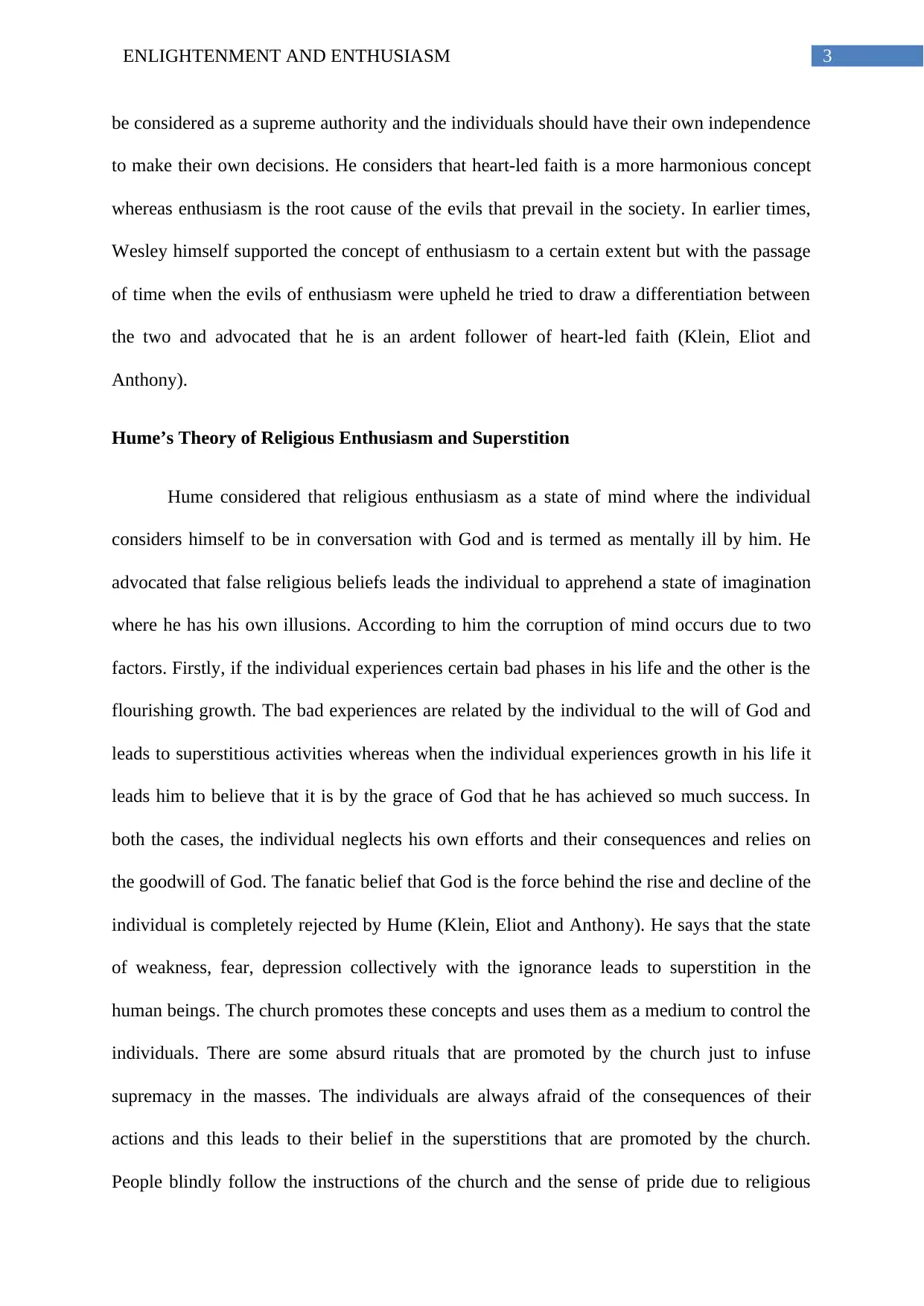
3ENLIGHTENMENT AND ENTHUSIASM
be considered as a supreme authority and the individuals should have their own independence
to make their own decisions. He considers that heart-led faith is a more harmonious concept
whereas enthusiasm is the root cause of the evils that prevail in the society. In earlier times,
Wesley himself supported the concept of enthusiasm to a certain extent but with the passage
of time when the evils of enthusiasm were upheld he tried to draw a differentiation between
the two and advocated that he is an ardent follower of heart-led faith (Klein, Eliot and
Anthony).
Hume’s Theory of Religious Enthusiasm and Superstition
Hume considered that religious enthusiasm as a state of mind where the individual
considers himself to be in conversation with God and is termed as mentally ill by him. He
advocated that false religious beliefs leads the individual to apprehend a state of imagination
where he has his own illusions. According to him the corruption of mind occurs due to two
factors. Firstly, if the individual experiences certain bad phases in his life and the other is the
flourishing growth. The bad experiences are related by the individual to the will of God and
leads to superstitious activities whereas when the individual experiences growth in his life it
leads him to believe that it is by the grace of God that he has achieved so much success. In
both the cases, the individual neglects his own efforts and their consequences and relies on
the goodwill of God. The fanatic belief that God is the force behind the rise and decline of the
individual is completely rejected by Hume (Klein, Eliot and Anthony). He says that the state
of weakness, fear, depression collectively with the ignorance leads to superstition in the
human beings. The church promotes these concepts and uses them as a medium to control the
individuals. There are some absurd rituals that are promoted by the church just to infuse
supremacy in the masses. The individuals are always afraid of the consequences of their
actions and this leads to their belief in the superstitions that are promoted by the church.
People blindly follow the instructions of the church and the sense of pride due to religious
be considered as a supreme authority and the individuals should have their own independence
to make their own decisions. He considers that heart-led faith is a more harmonious concept
whereas enthusiasm is the root cause of the evils that prevail in the society. In earlier times,
Wesley himself supported the concept of enthusiasm to a certain extent but with the passage
of time when the evils of enthusiasm were upheld he tried to draw a differentiation between
the two and advocated that he is an ardent follower of heart-led faith (Klein, Eliot and
Anthony).
Hume’s Theory of Religious Enthusiasm and Superstition
Hume considered that religious enthusiasm as a state of mind where the individual
considers himself to be in conversation with God and is termed as mentally ill by him. He
advocated that false religious beliefs leads the individual to apprehend a state of imagination
where he has his own illusions. According to him the corruption of mind occurs due to two
factors. Firstly, if the individual experiences certain bad phases in his life and the other is the
flourishing growth. The bad experiences are related by the individual to the will of God and
leads to superstitious activities whereas when the individual experiences growth in his life it
leads him to believe that it is by the grace of God that he has achieved so much success. In
both the cases, the individual neglects his own efforts and their consequences and relies on
the goodwill of God. The fanatic belief that God is the force behind the rise and decline of the
individual is completely rejected by Hume (Klein, Eliot and Anthony). He says that the state
of weakness, fear, depression collectively with the ignorance leads to superstition in the
human beings. The church promotes these concepts and uses them as a medium to control the
individuals. There are some absurd rituals that are promoted by the church just to infuse
supremacy in the masses. The individuals are always afraid of the consequences of their
actions and this leads to their belief in the superstitions that are promoted by the church.
People blindly follow the instructions of the church and the sense of pride due to religious
Paraphrase This Document
Need a fresh take? Get an instant paraphrase of this document with our AI Paraphraser
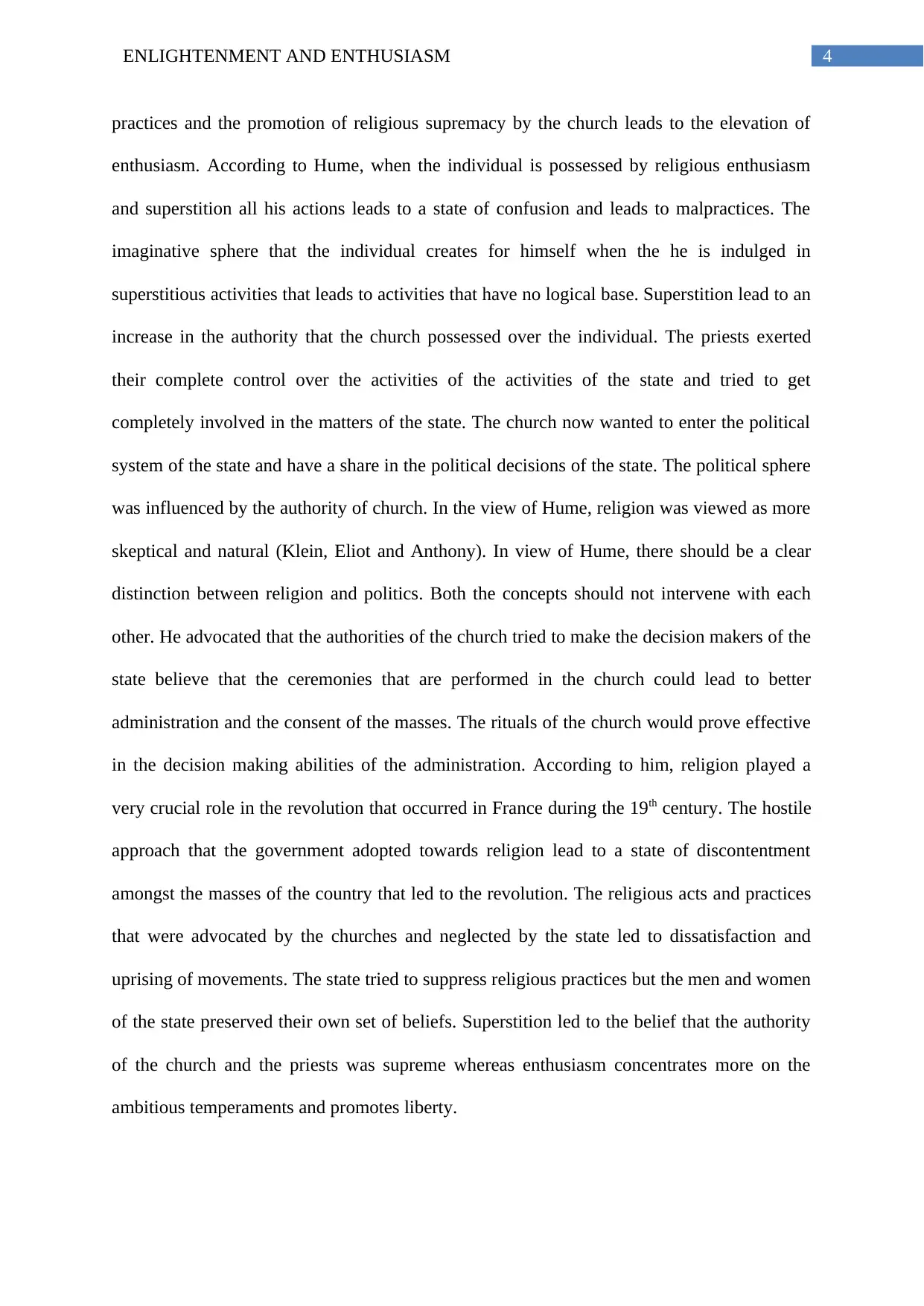
4ENLIGHTENMENT AND ENTHUSIASM
practices and the promotion of religious supremacy by the church leads to the elevation of
enthusiasm. According to Hume, when the individual is possessed by religious enthusiasm
and superstition all his actions leads to a state of confusion and leads to malpractices. The
imaginative sphere that the individual creates for himself when the he is indulged in
superstitious activities that leads to activities that have no logical base. Superstition lead to an
increase in the authority that the church possessed over the individual. The priests exerted
their complete control over the activities of the activities of the state and tried to get
completely involved in the matters of the state. The church now wanted to enter the political
system of the state and have a share in the political decisions of the state. The political sphere
was influenced by the authority of church. In the view of Hume, religion was viewed as more
skeptical and natural (Klein, Eliot and Anthony). In view of Hume, there should be a clear
distinction between religion and politics. Both the concepts should not intervene with each
other. He advocated that the authorities of the church tried to make the decision makers of the
state believe that the ceremonies that are performed in the church could lead to better
administration and the consent of the masses. The rituals of the church would prove effective
in the decision making abilities of the administration. According to him, religion played a
very crucial role in the revolution that occurred in France during the 19th century. The hostile
approach that the government adopted towards religion lead to a state of discontentment
amongst the masses of the country that led to the revolution. The religious acts and practices
that were advocated by the churches and neglected by the state led to dissatisfaction and
uprising of movements. The state tried to suppress religious practices but the men and women
of the state preserved their own set of beliefs. Superstition led to the belief that the authority
of the church and the priests was supreme whereas enthusiasm concentrates more on the
ambitious temperaments and promotes liberty.
practices and the promotion of religious supremacy by the church leads to the elevation of
enthusiasm. According to Hume, when the individual is possessed by religious enthusiasm
and superstition all his actions leads to a state of confusion and leads to malpractices. The
imaginative sphere that the individual creates for himself when the he is indulged in
superstitious activities that leads to activities that have no logical base. Superstition lead to an
increase in the authority that the church possessed over the individual. The priests exerted
their complete control over the activities of the activities of the state and tried to get
completely involved in the matters of the state. The church now wanted to enter the political
system of the state and have a share in the political decisions of the state. The political sphere
was influenced by the authority of church. In the view of Hume, religion was viewed as more
skeptical and natural (Klein, Eliot and Anthony). In view of Hume, there should be a clear
distinction between religion and politics. Both the concepts should not intervene with each
other. He advocated that the authorities of the church tried to make the decision makers of the
state believe that the ceremonies that are performed in the church could lead to better
administration and the consent of the masses. The rituals of the church would prove effective
in the decision making abilities of the administration. According to him, religion played a
very crucial role in the revolution that occurred in France during the 19th century. The hostile
approach that the government adopted towards religion lead to a state of discontentment
amongst the masses of the country that led to the revolution. The religious acts and practices
that were advocated by the churches and neglected by the state led to dissatisfaction and
uprising of movements. The state tried to suppress religious practices but the men and women
of the state preserved their own set of beliefs. Superstition led to the belief that the authority
of the church and the priests was supreme whereas enthusiasm concentrates more on the
ambitious temperaments and promotes liberty.
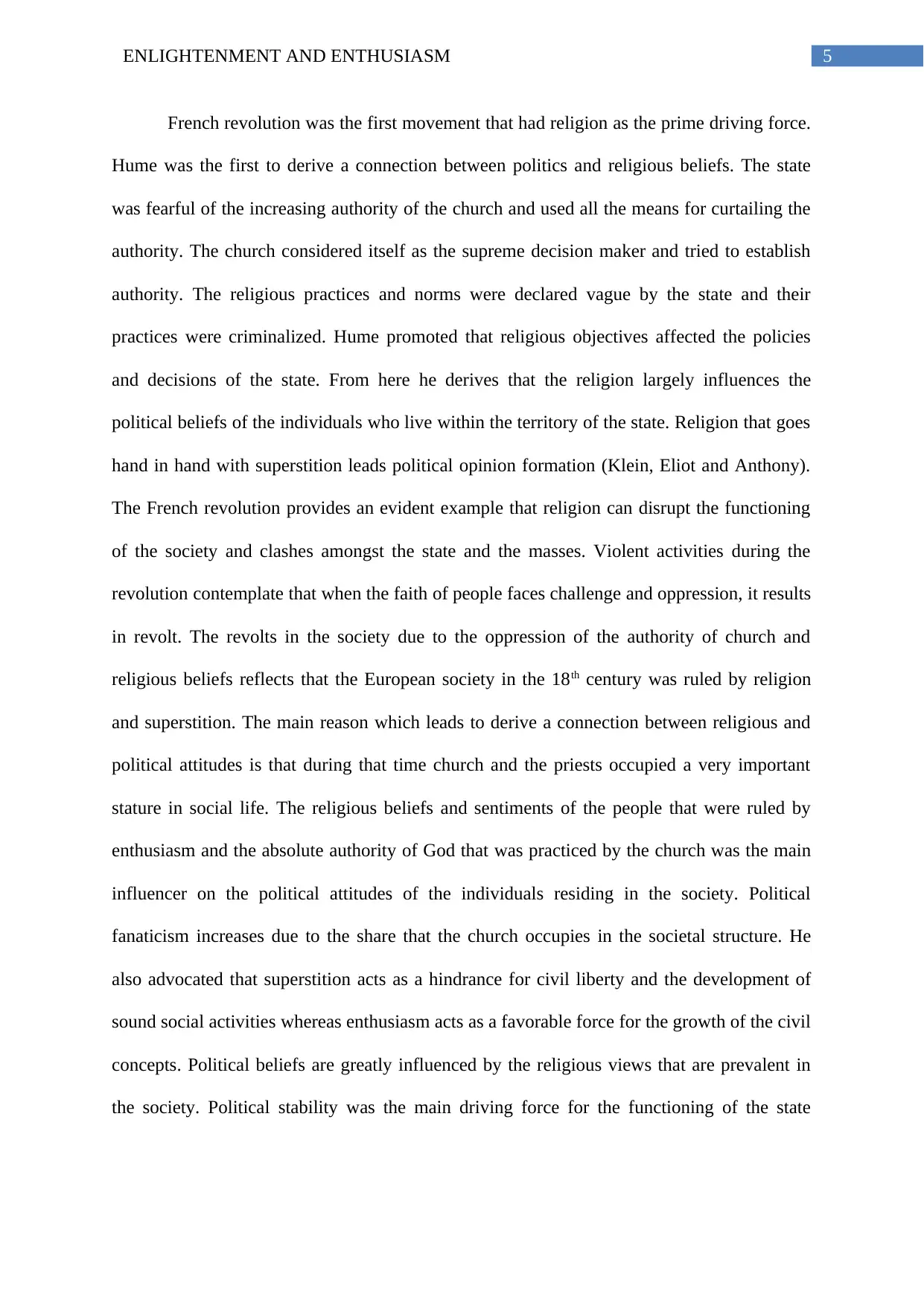
5ENLIGHTENMENT AND ENTHUSIASM
French revolution was the first movement that had religion as the prime driving force.
Hume was the first to derive a connection between politics and religious beliefs. The state
was fearful of the increasing authority of the church and used all the means for curtailing the
authority. The church considered itself as the supreme decision maker and tried to establish
authority. The religious practices and norms were declared vague by the state and their
practices were criminalized. Hume promoted that religious objectives affected the policies
and decisions of the state. From here he derives that the religion largely influences the
political beliefs of the individuals who live within the territory of the state. Religion that goes
hand in hand with superstition leads political opinion formation (Klein, Eliot and Anthony).
The French revolution provides an evident example that religion can disrupt the functioning
of the society and clashes amongst the state and the masses. Violent activities during the
revolution contemplate that when the faith of people faces challenge and oppression, it results
in revolt. The revolts in the society due to the oppression of the authority of church and
religious beliefs reflects that the European society in the 18th century was ruled by religion
and superstition. The main reason which leads to derive a connection between religious and
political attitudes is that during that time church and the priests occupied a very important
stature in social life. The religious beliefs and sentiments of the people that were ruled by
enthusiasm and the absolute authority of God that was practiced by the church was the main
influencer on the political attitudes of the individuals residing in the society. Political
fanaticism increases due to the share that the church occupies in the societal structure. He
also advocated that superstition acts as a hindrance for civil liberty and the development of
sound social activities whereas enthusiasm acts as a favorable force for the growth of the civil
concepts. Political beliefs are greatly influenced by the religious views that are prevalent in
the society. Political stability was the main driving force for the functioning of the state
French revolution was the first movement that had religion as the prime driving force.
Hume was the first to derive a connection between politics and religious beliefs. The state
was fearful of the increasing authority of the church and used all the means for curtailing the
authority. The church considered itself as the supreme decision maker and tried to establish
authority. The religious practices and norms were declared vague by the state and their
practices were criminalized. Hume promoted that religious objectives affected the policies
and decisions of the state. From here he derives that the religion largely influences the
political beliefs of the individuals who live within the territory of the state. Religion that goes
hand in hand with superstition leads political opinion formation (Klein, Eliot and Anthony).
The French revolution provides an evident example that religion can disrupt the functioning
of the society and clashes amongst the state and the masses. Violent activities during the
revolution contemplate that when the faith of people faces challenge and oppression, it results
in revolt. The revolts in the society due to the oppression of the authority of church and
religious beliefs reflects that the European society in the 18th century was ruled by religion
and superstition. The main reason which leads to derive a connection between religious and
political attitudes is that during that time church and the priests occupied a very important
stature in social life. The religious beliefs and sentiments of the people that were ruled by
enthusiasm and the absolute authority of God that was practiced by the church was the main
influencer on the political attitudes of the individuals residing in the society. Political
fanaticism increases due to the share that the church occupies in the societal structure. He
also advocated that superstition acts as a hindrance for civil liberty and the development of
sound social activities whereas enthusiasm acts as a favorable force for the growth of the civil
concepts. Political beliefs are greatly influenced by the religious views that are prevalent in
the society. Political stability was the main driving force for the functioning of the state
⊘ This is a preview!⊘
Do you want full access?
Subscribe today to unlock all pages.

Trusted by 1+ million students worldwide
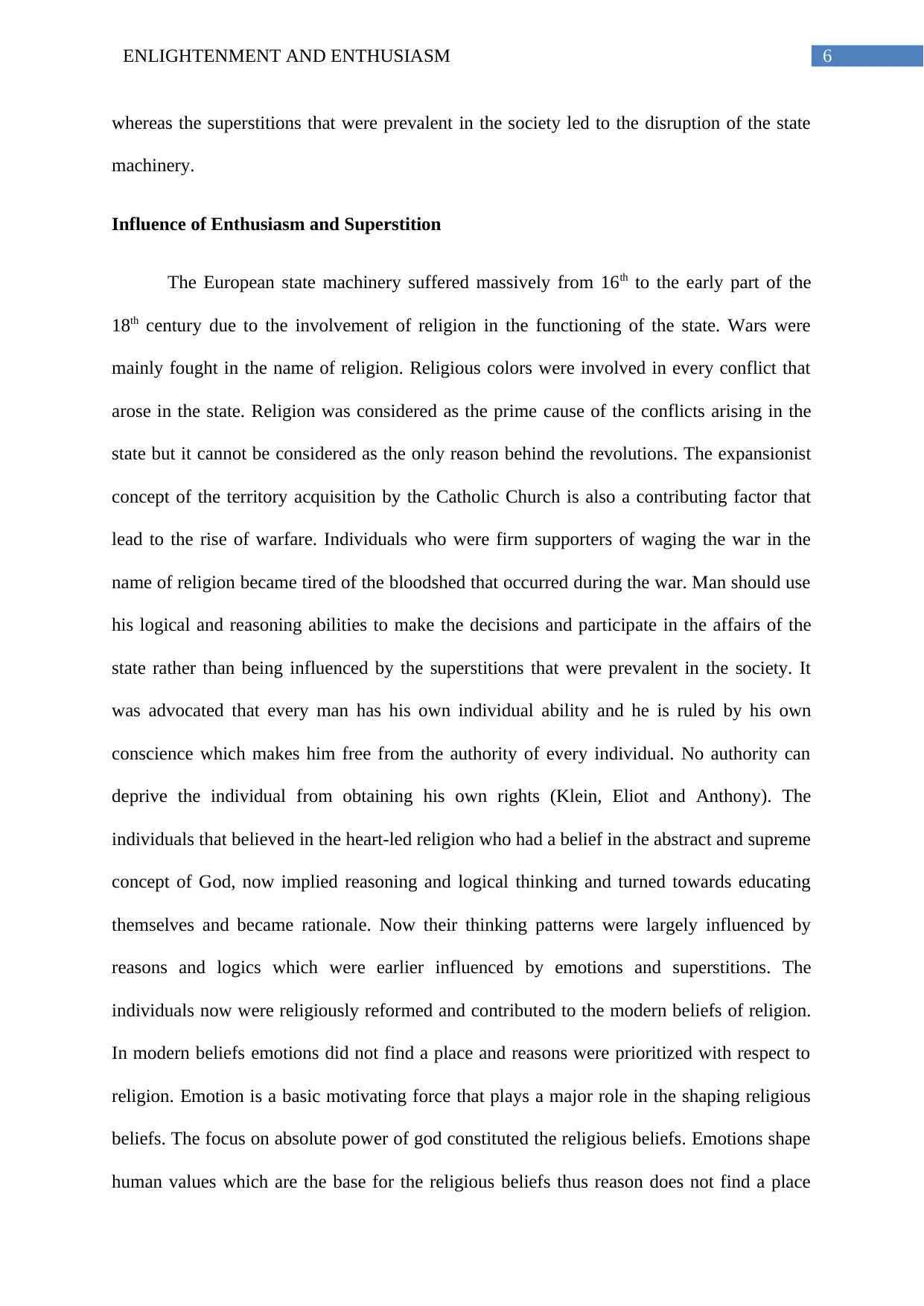
6ENLIGHTENMENT AND ENTHUSIASM
whereas the superstitions that were prevalent in the society led to the disruption of the state
machinery.
Influence of Enthusiasm and Superstition
The European state machinery suffered massively from 16th to the early part of the
18th century due to the involvement of religion in the functioning of the state. Wars were
mainly fought in the name of religion. Religious colors were involved in every conflict that
arose in the state. Religion was considered as the prime cause of the conflicts arising in the
state but it cannot be considered as the only reason behind the revolutions. The expansionist
concept of the territory acquisition by the Catholic Church is also a contributing factor that
lead to the rise of warfare. Individuals who were firm supporters of waging the war in the
name of religion became tired of the bloodshed that occurred during the war. Man should use
his logical and reasoning abilities to make the decisions and participate in the affairs of the
state rather than being influenced by the superstitions that were prevalent in the society. It
was advocated that every man has his own individual ability and he is ruled by his own
conscience which makes him free from the authority of every individual. No authority can
deprive the individual from obtaining his own rights (Klein, Eliot and Anthony). The
individuals that believed in the heart-led religion who had a belief in the abstract and supreme
concept of God, now implied reasoning and logical thinking and turned towards educating
themselves and became rationale. Now their thinking patterns were largely influenced by
reasons and logics which were earlier influenced by emotions and superstitions. The
individuals now were religiously reformed and contributed to the modern beliefs of religion.
In modern beliefs emotions did not find a place and reasons were prioritized with respect to
religion. Emotion is a basic motivating force that plays a major role in the shaping religious
beliefs. The focus on absolute power of god constituted the religious beliefs. Emotions shape
human values which are the base for the religious beliefs thus reason does not find a place
whereas the superstitions that were prevalent in the society led to the disruption of the state
machinery.
Influence of Enthusiasm and Superstition
The European state machinery suffered massively from 16th to the early part of the
18th century due to the involvement of religion in the functioning of the state. Wars were
mainly fought in the name of religion. Religious colors were involved in every conflict that
arose in the state. Religion was considered as the prime cause of the conflicts arising in the
state but it cannot be considered as the only reason behind the revolutions. The expansionist
concept of the territory acquisition by the Catholic Church is also a contributing factor that
lead to the rise of warfare. Individuals who were firm supporters of waging the war in the
name of religion became tired of the bloodshed that occurred during the war. Man should use
his logical and reasoning abilities to make the decisions and participate in the affairs of the
state rather than being influenced by the superstitions that were prevalent in the society. It
was advocated that every man has his own individual ability and he is ruled by his own
conscience which makes him free from the authority of every individual. No authority can
deprive the individual from obtaining his own rights (Klein, Eliot and Anthony). The
individuals that believed in the heart-led religion who had a belief in the abstract and supreme
concept of God, now implied reasoning and logical thinking and turned towards educating
themselves and became rationale. Now their thinking patterns were largely influenced by
reasons and logics which were earlier influenced by emotions and superstitions. The
individuals now were religiously reformed and contributed to the modern beliefs of religion.
In modern beliefs emotions did not find a place and reasons were prioritized with respect to
religion. Emotion is a basic motivating force that plays a major role in the shaping religious
beliefs. The focus on absolute power of god constituted the religious beliefs. Emotions shape
human values which are the base for the religious beliefs thus reason does not find a place
Paraphrase This Document
Need a fresh take? Get an instant paraphrase of this document with our AI Paraphraser
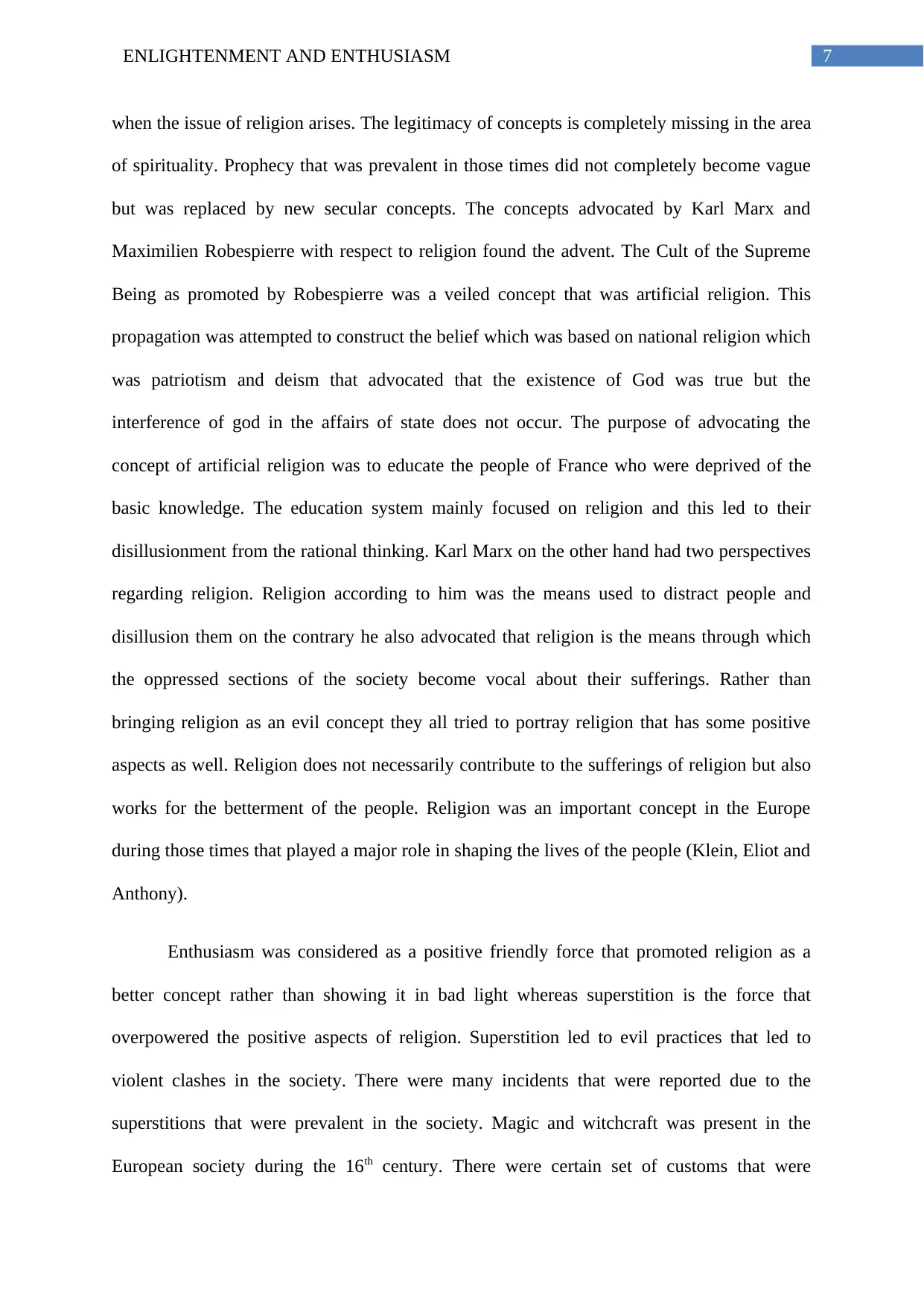
7ENLIGHTENMENT AND ENTHUSIASM
when the issue of religion arises. The legitimacy of concepts is completely missing in the area
of spirituality. Prophecy that was prevalent in those times did not completely become vague
but was replaced by new secular concepts. The concepts advocated by Karl Marx and
Maximilien Robespierre with respect to religion found the advent. The Cult of the Supreme
Being as promoted by Robespierre was a veiled concept that was artificial religion. This
propagation was attempted to construct the belief which was based on national religion which
was patriotism and deism that advocated that the existence of God was true but the
interference of god in the affairs of state does not occur. The purpose of advocating the
concept of artificial religion was to educate the people of France who were deprived of the
basic knowledge. The education system mainly focused on religion and this led to their
disillusionment from the rational thinking. Karl Marx on the other hand had two perspectives
regarding religion. Religion according to him was the means used to distract people and
disillusion them on the contrary he also advocated that religion is the means through which
the oppressed sections of the society become vocal about their sufferings. Rather than
bringing religion as an evil concept they all tried to portray religion that has some positive
aspects as well. Religion does not necessarily contribute to the sufferings of religion but also
works for the betterment of the people. Religion was an important concept in the Europe
during those times that played a major role in shaping the lives of the people (Klein, Eliot and
Anthony).
Enthusiasm was considered as a positive friendly force that promoted religion as a
better concept rather than showing it in bad light whereas superstition is the force that
overpowered the positive aspects of religion. Superstition led to evil practices that led to
violent clashes in the society. There were many incidents that were reported due to the
superstitions that were prevalent in the society. Magic and witchcraft was present in the
European society during the 16th century. There were certain set of customs that were
when the issue of religion arises. The legitimacy of concepts is completely missing in the area
of spirituality. Prophecy that was prevalent in those times did not completely become vague
but was replaced by new secular concepts. The concepts advocated by Karl Marx and
Maximilien Robespierre with respect to religion found the advent. The Cult of the Supreme
Being as promoted by Robespierre was a veiled concept that was artificial religion. This
propagation was attempted to construct the belief which was based on national religion which
was patriotism and deism that advocated that the existence of God was true but the
interference of god in the affairs of state does not occur. The purpose of advocating the
concept of artificial religion was to educate the people of France who were deprived of the
basic knowledge. The education system mainly focused on religion and this led to their
disillusionment from the rational thinking. Karl Marx on the other hand had two perspectives
regarding religion. Religion according to him was the means used to distract people and
disillusion them on the contrary he also advocated that religion is the means through which
the oppressed sections of the society become vocal about their sufferings. Rather than
bringing religion as an evil concept they all tried to portray religion that has some positive
aspects as well. Religion does not necessarily contribute to the sufferings of religion but also
works for the betterment of the people. Religion was an important concept in the Europe
during those times that played a major role in shaping the lives of the people (Klein, Eliot and
Anthony).
Enthusiasm was considered as a positive friendly force that promoted religion as a
better concept rather than showing it in bad light whereas superstition is the force that
overpowered the positive aspects of religion. Superstition led to evil practices that led to
violent clashes in the society. There were many incidents that were reported due to the
superstitions that were prevalent in the society. Magic and witchcraft was present in the
European society during the 16th century. There were certain set of customs that were
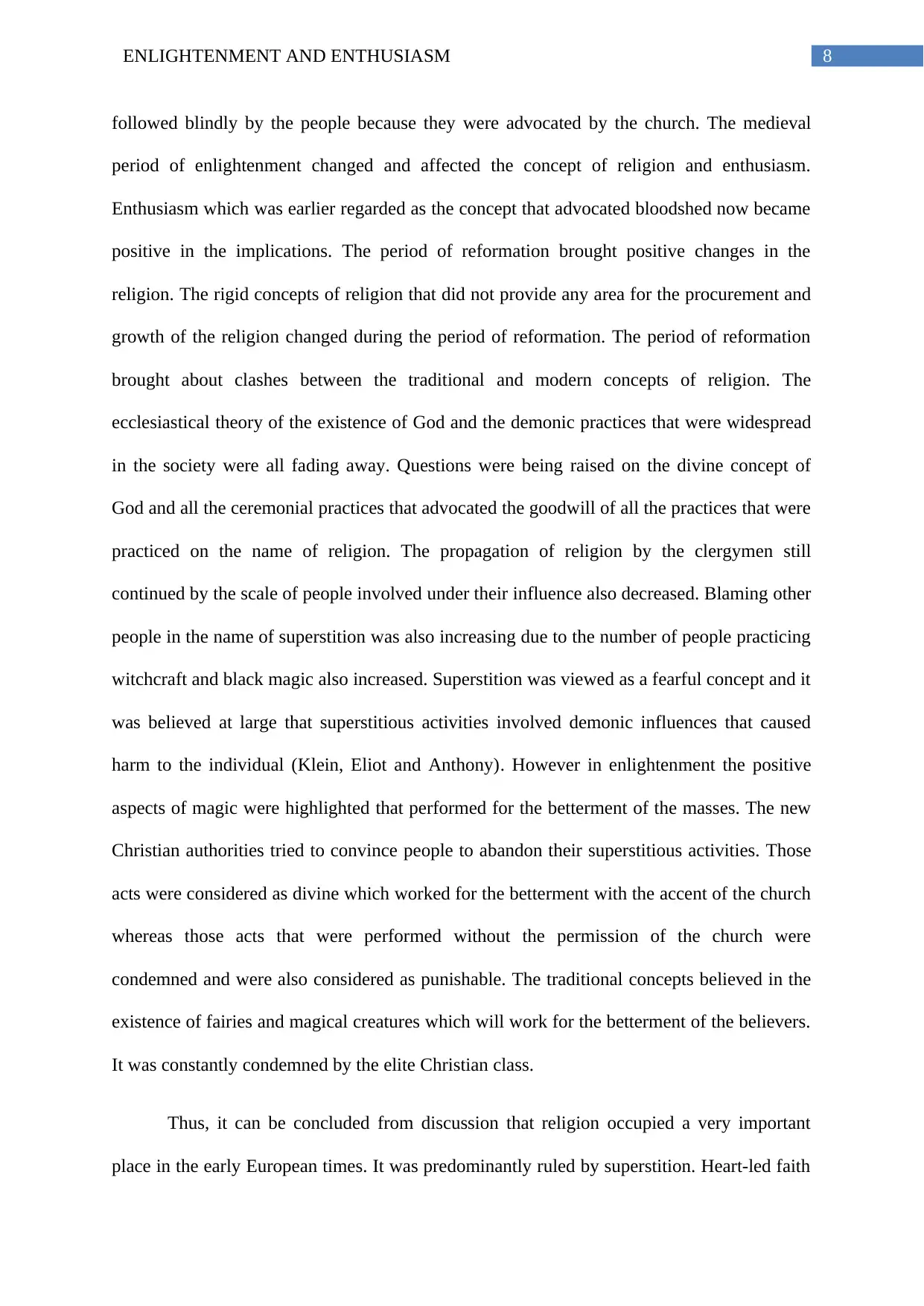
8ENLIGHTENMENT AND ENTHUSIASM
followed blindly by the people because they were advocated by the church. The medieval
period of enlightenment changed and affected the concept of religion and enthusiasm.
Enthusiasm which was earlier regarded as the concept that advocated bloodshed now became
positive in the implications. The period of reformation brought positive changes in the
religion. The rigid concepts of religion that did not provide any area for the procurement and
growth of the religion changed during the period of reformation. The period of reformation
brought about clashes between the traditional and modern concepts of religion. The
ecclesiastical theory of the existence of God and the demonic practices that were widespread
in the society were all fading away. Questions were being raised on the divine concept of
God and all the ceremonial practices that advocated the goodwill of all the practices that were
practiced on the name of religion. The propagation of religion by the clergymen still
continued by the scale of people involved under their influence also decreased. Blaming other
people in the name of superstition was also increasing due to the number of people practicing
witchcraft and black magic also increased. Superstition was viewed as a fearful concept and it
was believed at large that superstitious activities involved demonic influences that caused
harm to the individual (Klein, Eliot and Anthony). However in enlightenment the positive
aspects of magic were highlighted that performed for the betterment of the masses. The new
Christian authorities tried to convince people to abandon their superstitious activities. Those
acts were considered as divine which worked for the betterment with the accent of the church
whereas those acts that were performed without the permission of the church were
condemned and were also considered as punishable. The traditional concepts believed in the
existence of fairies and magical creatures which will work for the betterment of the believers.
It was constantly condemned by the elite Christian class.
Thus, it can be concluded from discussion that religion occupied a very important
place in the early European times. It was predominantly ruled by superstition. Heart-led faith
followed blindly by the people because they were advocated by the church. The medieval
period of enlightenment changed and affected the concept of religion and enthusiasm.
Enthusiasm which was earlier regarded as the concept that advocated bloodshed now became
positive in the implications. The period of reformation brought positive changes in the
religion. The rigid concepts of religion that did not provide any area for the procurement and
growth of the religion changed during the period of reformation. The period of reformation
brought about clashes between the traditional and modern concepts of religion. The
ecclesiastical theory of the existence of God and the demonic practices that were widespread
in the society were all fading away. Questions were being raised on the divine concept of
God and all the ceremonial practices that advocated the goodwill of all the practices that were
practiced on the name of religion. The propagation of religion by the clergymen still
continued by the scale of people involved under their influence also decreased. Blaming other
people in the name of superstition was also increasing due to the number of people practicing
witchcraft and black magic also increased. Superstition was viewed as a fearful concept and it
was believed at large that superstitious activities involved demonic influences that caused
harm to the individual (Klein, Eliot and Anthony). However in enlightenment the positive
aspects of magic were highlighted that performed for the betterment of the masses. The new
Christian authorities tried to convince people to abandon their superstitious activities. Those
acts were considered as divine which worked for the betterment with the accent of the church
whereas those acts that were performed without the permission of the church were
condemned and were also considered as punishable. The traditional concepts believed in the
existence of fairies and magical creatures which will work for the betterment of the believers.
It was constantly condemned by the elite Christian class.
Thus, it can be concluded from discussion that religion occupied a very important
place in the early European times. It was predominantly ruled by superstition. Heart-led faith
⊘ This is a preview!⊘
Do you want full access?
Subscribe today to unlock all pages.

Trusted by 1+ million students worldwide
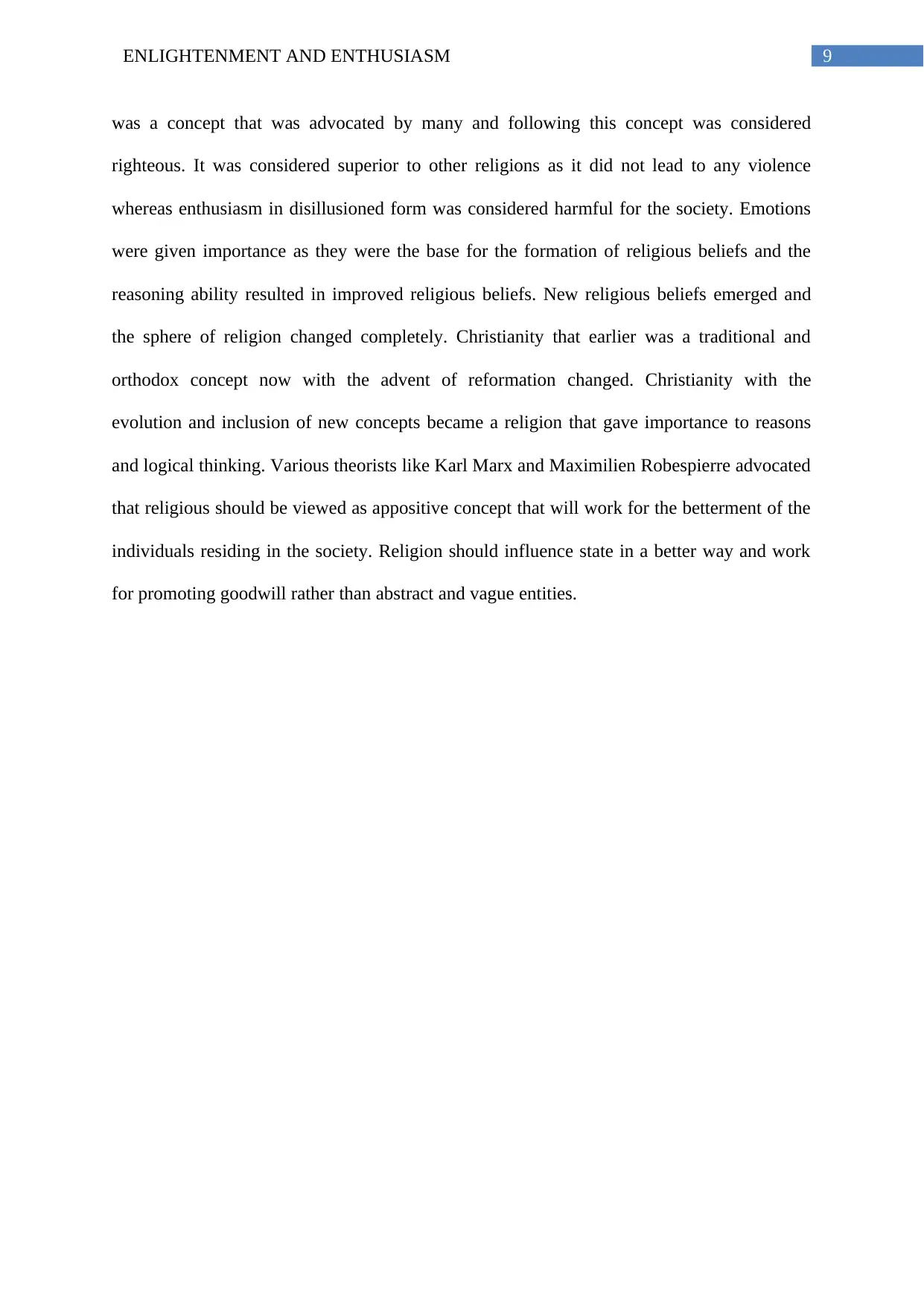
9ENLIGHTENMENT AND ENTHUSIASM
was a concept that was advocated by many and following this concept was considered
righteous. It was considered superior to other religions as it did not lead to any violence
whereas enthusiasm in disillusioned form was considered harmful for the society. Emotions
were given importance as they were the base for the formation of religious beliefs and the
reasoning ability resulted in improved religious beliefs. New religious beliefs emerged and
the sphere of religion changed completely. Christianity that earlier was a traditional and
orthodox concept now with the advent of reformation changed. Christianity with the
evolution and inclusion of new concepts became a religion that gave importance to reasons
and logical thinking. Various theorists like Karl Marx and Maximilien Robespierre advocated
that religious should be viewed as appositive concept that will work for the betterment of the
individuals residing in the society. Religion should influence state in a better way and work
for promoting goodwill rather than abstract and vague entities.
was a concept that was advocated by many and following this concept was considered
righteous. It was considered superior to other religions as it did not lead to any violence
whereas enthusiasm in disillusioned form was considered harmful for the society. Emotions
were given importance as they were the base for the formation of religious beliefs and the
reasoning ability resulted in improved religious beliefs. New religious beliefs emerged and
the sphere of religion changed completely. Christianity that earlier was a traditional and
orthodox concept now with the advent of reformation changed. Christianity with the
evolution and inclusion of new concepts became a religion that gave importance to reasons
and logical thinking. Various theorists like Karl Marx and Maximilien Robespierre advocated
that religious should be viewed as appositive concept that will work for the betterment of the
individuals residing in the society. Religion should influence state in a better way and work
for promoting goodwill rather than abstract and vague entities.
Paraphrase This Document
Need a fresh take? Get an instant paraphrase of this document with our AI Paraphraser
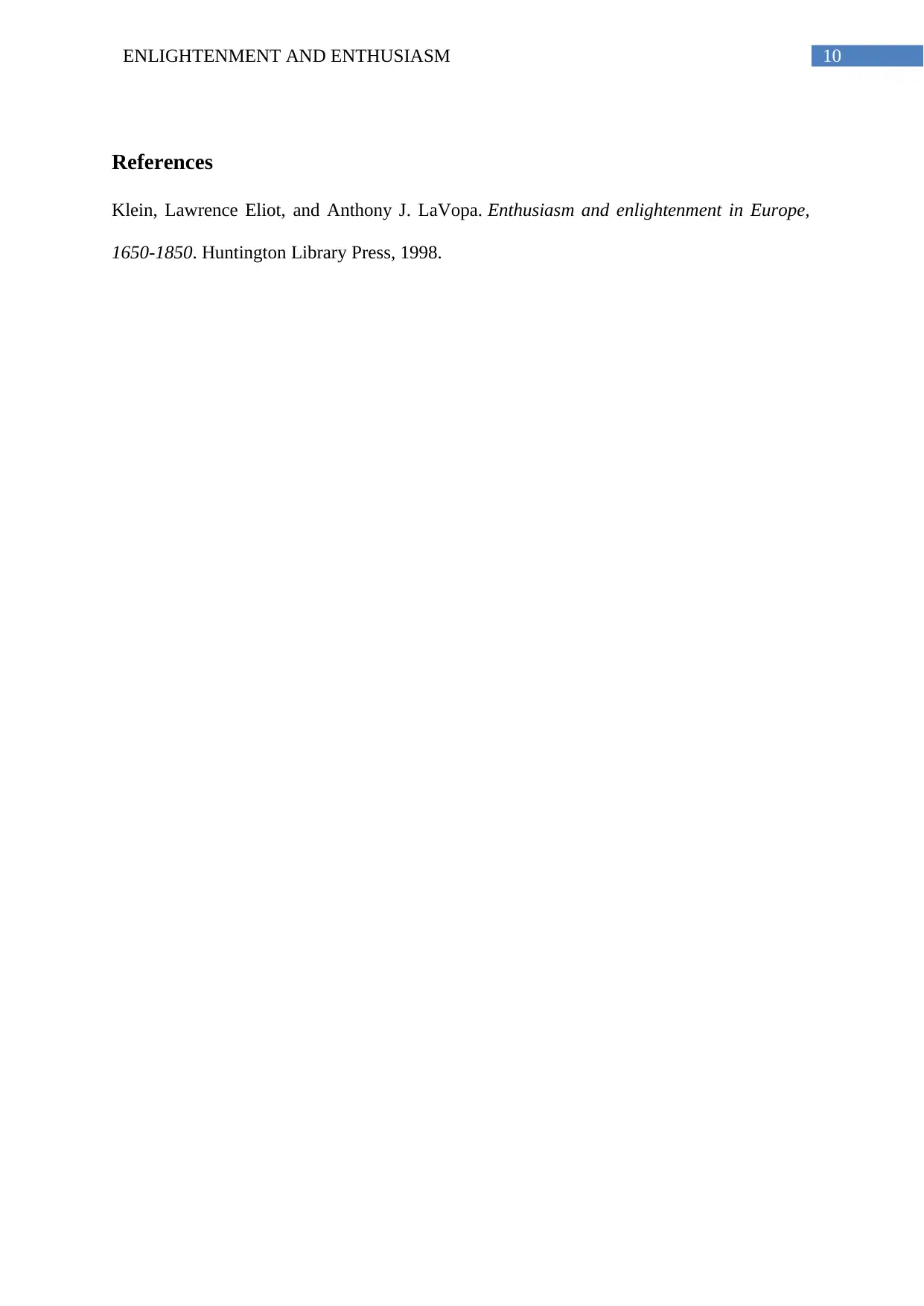
10ENLIGHTENMENT AND ENTHUSIASM
References
Klein, Lawrence Eliot, and Anthony J. LaVopa. Enthusiasm and enlightenment in Europe,
1650-1850. Huntington Library Press, 1998.
References
Klein, Lawrence Eliot, and Anthony J. LaVopa. Enthusiasm and enlightenment in Europe,
1650-1850. Huntington Library Press, 1998.
1 out of 11
Related Documents
Your All-in-One AI-Powered Toolkit for Academic Success.
+13062052269
info@desklib.com
Available 24*7 on WhatsApp / Email
![[object Object]](/_next/static/media/star-bottom.7253800d.svg)
Unlock your academic potential
Copyright © 2020–2026 A2Z Services. All Rights Reserved. Developed and managed by ZUCOL.





